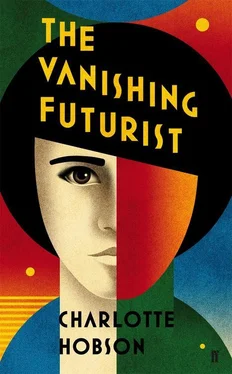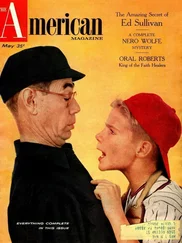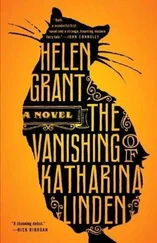‘Now get in the trap,’ he ordered, ‘and you can tell me the news of the family while we travel. I want to get you back to Jarvekula straight away. I am sorry to say such a thing, but you look terrible, my children. Never mind, thank God the war is over in Estonia, at least. You will have your baby here, my dear.’
The year was just tipping over into spring; every day the ground dried out a little more and the buds swelled. The Rauds, kind, generous people that they were, housed us for almost six months. Like all women waiting for their first baby to be born, I could not quite believe that an entirely new person was about to arrive in the world. I was scared – not so much that our living conditions might have affected her (I could sense how healthy she was inside me), nor of the birth itself, but of the great burden of sorrow that she would immediately have to shoulder. Yet when, in the middle of April, she emerged – you emerged – tiny and hairy-eared as a little wood sprite, with large, serene, dark eyes, I saw that my fears were quite irrelevant. We called you Sophia – for Sonya, and also for the calm wisdom that you seemed to exude. You immediately knew what to do, eating, sleeping and looking about you with lovely solemnity. I was tired, of course, in the first months, but now my little Sophy was here, the terrible events of the past year seemed somehow to make more sense.
In September we packed up and sailed for Paris, after exacting a promise from the Rauds that they would visit us soon. You were by then a solid baby with creases on your wrists and a throaty little laugh and Pasha had, at last, tracked down his parents. We had heard nothing from them more recently than November 1918, when they had left Russia for Marseilles. As a last resort, Pasha wrote to put an advertisement in the Figaro . A week later, to our amazement, a boy came up the track to Jarvekula with not one but three telegrams in his hand, all from Mr Kobelev. The first: ‘Dearest children we are in Paris stop your mother Liza Dima all well stop send news.’ The second: ‘Dears come immediately I will wire funds Bank of Estonia.’ The third, simply: ‘All to meet boat Calais.’
Before we left, we decided to tell Pasha’s father about Sonya by telegram. We felt it was better that he break the news to the others gently, before we arrived. There was a part of me that dreaded seeing them; again and again I saw poor Sonya lying on the divan in the study, glassy-eyed, while I tried to feed her broth.
The thought also struck me now, as it had signally failed to do when Pasha and I were signing our marriage certificate at the Guild Hall, that the Kobelevs might be less than pleased at their new daughter-in-law and their not-quite-granddaughter. Pasha and I agreed on an official line: we had had a Communist wedding in Russia, but having lost our papers in our hurried exit from Russia we’d decided to formalise our situation in Tallinn. It went without saying that you were his daughter.
My beloved Sophy, you’ve already learnt so many shocking and terrifying facts about your birth in these pages that perhaps the date of your birth will hardly matter to you; yet all these years, you know, I have held a little private celebration for you in mid-April, a private thanksgiving for my daughter accompanied by a plea for your forgiveness at having deceived you. All your life you have celebrated your birthday a month late, in mid-May; this began when we sailed out of Estonia. We could not risk his parents counting up the months and wondering how you could have been conceived when Pasha was still in the Crimea.
We came down the gangplank at Calais into a sea of waiting, anxious faces. I was carrying you, Pasha was heaving our suitcases; he was shaking with emotion. Where were they? And then – Liza. I saw her before she saw us, a tall, pale girl of sixteen, her expression reserved, chewing her lip – and suddenly she caught sight of her brother. She let out a piercing scream, and jumped in the air, blazing with joy. Beside her Dima began to wave and shout – ‘Over here! Over here!’ And pushing forward, Mr Kobelev, barely taller than his son, grey-haired, beaming and crinkling up his eyes which were already full of tears and his wife beside him… It was more than we could do to say anything at all; we embraced each other, round and round, and you smiled so sweetly at your grandparents, your aunt and uncle, and as your grandmother laid her cheek against your silken baby head, she let out a terrible sob, and said, ‘Sonya.’
We stayed with them in Paris for some weeks, until everything that could be said had been said; we told them everything, only keeping from them the truth about your father for your sake as well as for my own. The story of my ideals and my actions seemed too strange and confused for them to understand; maybe I couldn’t make sense of them to myself, either. It was a relief for me to edit out those months when I loved Nikita and when I would have done anything to make him love me.
This set the pattern for Pasha’s and my life together. In every other detail than biological Pasha was your father, as you know; he was devoted to you. I never managed to have another child; and once I asked Pasha if he was sad not to have more children. ‘Why on earth would I be,’ he said, hugging you to him, ‘when I have my own angel?’
We set up home in London, it being easier for both of us to find work here, and after a couple of years your grandparents joined us. Mr Kobelev was taken on by the Ethnography department at London University and Mrs Kobelev, who had, through some extraordinary strength of character, cured herself during their exile, now set up a small dressmaking business in the East End. She employed several other Russian women and proved an effective businesswoman. Liza went to veterinary college – I was so proud of her – she was one of only five female students accepted in 1923; and although she married before she qualified, she has practised as a veterinary assistant to her husband for many years. Dima grew into one of those English schoolboys, mighty in their cricket whites, whose charm and good looks waft them through life on golden wings. He started up endless business ventures and different careers, none of which led to a great deal, but no matter – his friends always came to his rescue with a new proposal. He seemed more English than any of us, although of course his faint accent and his name bequeathed him the lifelong nickname ‘Cossack’.
My parents did their duty and came to pay their respects to their new son-in-law and their granddaughter, but they made no bones about their discomfort and returned to Truro as soon as they could. My mother’s remark when (in a weak moment) I asked her what she thought of Pasha – Paul since we arrived in England – passed into family lore.
‘Well,’ she said, giving it some consideration, ‘he’s a little too interesting for you, dear.’
And so he was. We spent a good life together, with you, and later your boys, our grandchildren; his work in publishing, mine in the library; our political lives – both lifelong Socialists. We were an ordinary family, bourgeois by the IRT’s reckoning, although over the years it seemed to me that the daily demands of being a parent and attempting to hold onto one’s principles were a far more effective and gruelling programme of transformation than we ever envisaged in the commune. We grew old; our lives were not marked by any exceptional achievements, if you discount the raising of one clever, serious daughter who from the age of five had a tendency to dismantle every machine she ever came across, who – despite her parents’ lack of scientific ability – became a mineralogist and studied for a PhD in rare earth metals, who brought up her two sons to dream of social justice.
Читать дальше





![Майкл Муркок - Спящая волшебница / The Sleeping Sorceress [= Участь Белого Волка, Рыцарь Хаоса, The Vanishing Tower]](/books/327544/majkl-murkok-spyachaya-volshebnica-the-sleeping-sorc-thumb.webp)






